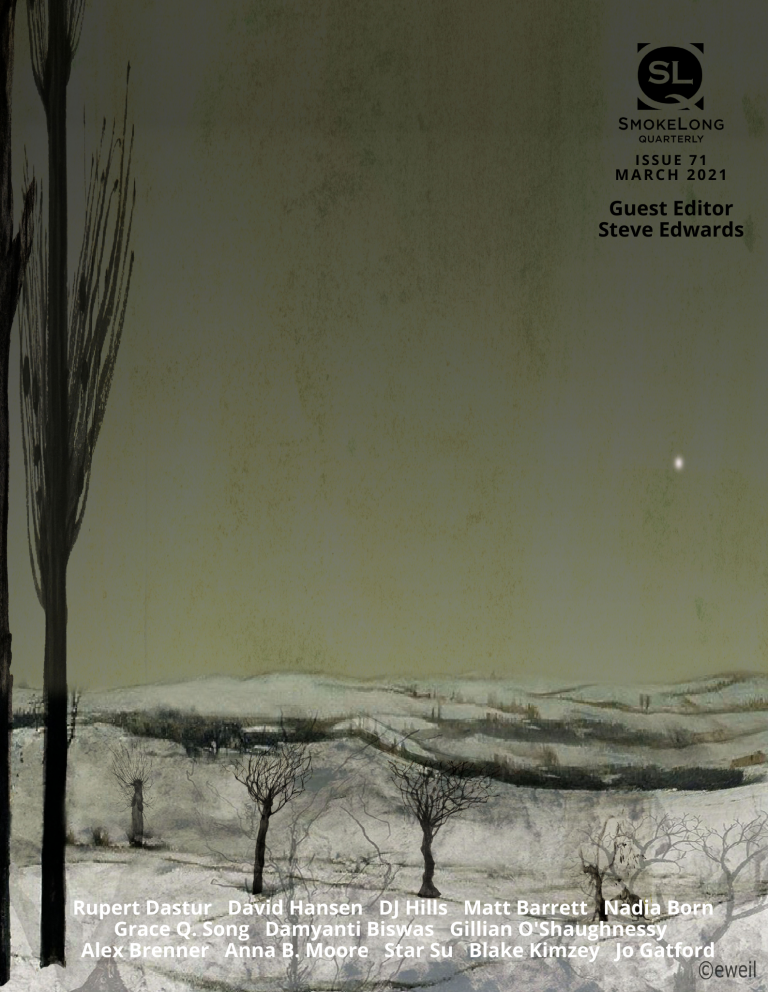One of my favorite lines is “Together, we are deeper than the trench that drops away offshore, and strong as the current that grips without warning.” I love the way you’ve layered simile with setting and characterization all in one line. Can you tell us a little about your process? How did this piece begin? Which layer emerges first in the process?
This story was actually born out of a SmokeLong workshop. The idea kept popping back into my head long after the workshop had finished. My story ideas are such shocking nags! They are often generated from one phrase and even if those precise words don’t survive the editing process, the narrative itself begins to weave its way around that central idea almost of its own accord. The setting came first, from a piece of coastline in the south west of Western Australia I am very familiar with. As a child, I spent a lot of time playing around the beach, waiting for my dad while he surfed. I find small shards of memory very helpful as a starting point, but from there the story is entirely fictional. The character of this little girl came next, almost as an apparition, a traumatized child who has internalized so much rage. I felt like she was sitting close by the whole time I was writing, whispering away with such intensity, sharing secrets. Is there such a thing as feeling like you’ve been possessed by your character?
There’s only one line of dialogue in this story. The mother says, “You and your father are the same.” This eloquently reveals the underlying tension between these characters even as it thwarts the expectation that dialogue is a spoken exchange. Why did you decide not to have the daughter reply to the mother?
Well, exactly, a dialogue doesn’t have to be literally spoken, and I think the daughter does reply. Silence can be a deliberate response, tremendously powerful. I’m fascinated by family dynamics, and the expectations we have of the mother-child relationship, that the bond is sacrosanct somehow, an absolute. I’m very close to my own beautiful mum, but I know many people who are not or who have very complex relationships and part of that complexity is centered in the huge expectations we build around this particular blood tie. I deliberately kept the mother very undeveloped as a character in herself in this story, because that’s how the little girl has dealt with their fractured relationship, she has erased her to some extent. Is there a more powerful reply than that? I think we believe children can’t process deep issues, so we can shield them somehow and hope they won’t notice. They do notice, and are very capable of making up their own narrative to explain their world if that’s all they have to go on.
The narrative shifts the moment we learn that the narrator’s brother drowned. In that paragraph, the narrator expresses deep wisdom without breaking the child’s perspective. How did you develop her voice?
She spoke to me. That sounds very wanky, but she did. And this angry child, who has weaponized silence, once she started talking, she had so much to say. I just listened and wrote it down. I don’t think I have ever written a character which demanded to be heard in quite the same way nor have I ever been so confident of a voice. I knew exactly what she would or wouldn’t say and what she wanted me to write. Not only does she believe her mother doesn’t love her, she believes her mother doesn’t like her and she’s not cowed or broken by this, she pushes back hard. I love her. I felt honored that she trusted me with her story, and very protective of her.
You took the risk (which works brilliantly) to repeat the phrase: “If she’d shared him ….” Was that a difficult decision or more of a gut choice?
I love repetition. It saves me thinking up new words. Seriously, I started, as I always do, with gut choices in the first draft, from there I work my way through the story and question everything. That’s a vital part of the process in flash for me because the writing has to be so tight, and decisions around every word that’s there and every word that’s left out need to be thoughtful. I think repetition can have a powerful effect, like a punch, but if you’re not careful how you use it, it can be simply a waste of precious words that would serve the story better. I know nothing about writing music but imagine it’s a bit like dropping in a short bass line or drum beat in a song. Well placed repetition is not only there to support the narrative but the music and rhythm of the story.
The seascape and the image of the dead dolphin are so vividly constructed. What is your connection to the ocean? Have you seen a dead dolphin in real life?
Thank you. I was born near the ocean and have never lived far from the sea. My first and happiest memories are there. I love it in every form, but mostly in winter, when it’s wild, when you can’t see below the surface, when there’s a sense of something uncontrollable and overwhelming. I have never seen a dead dolphin close up, only in photographs, but I have touched several live ones. They look so slick in the water, you’d expect their skin to be silky, but it’s surprisingly rough. There’s so much joy in the way they play in the waves, I wanted to bring that element in to the story to contrast with the heaviness of grief and the dread in this bleak seascape. The point, I guess, is that it all changes depending on your point of view, all the meaning is in our own perspective, in our own way of constructing the world around us.



 In its third year, The March Micro Marathon will be, as usual, a prompt-a-day whirlwind for 24 days. You’ll exchange drafts of micro fiction, non-fiction, and prose poetry in small groups and gather for a series of online events (all recorded for participants unable to attend live). We’ll finish with 3 competitions, and participants who are not already in SmokeLong Fitness will be invited to workshop with SmokeLong Fitness until the end of April!
In its third year, The March Micro Marathon will be, as usual, a prompt-a-day whirlwind for 24 days. You’ll exchange drafts of micro fiction, non-fiction, and prose poetry in small groups and gather for a series of online events (all recorded for participants unable to attend live). We’ll finish with 3 competitions, and participants who are not already in SmokeLong Fitness will be invited to workshop with SmokeLong Fitness until the end of April!